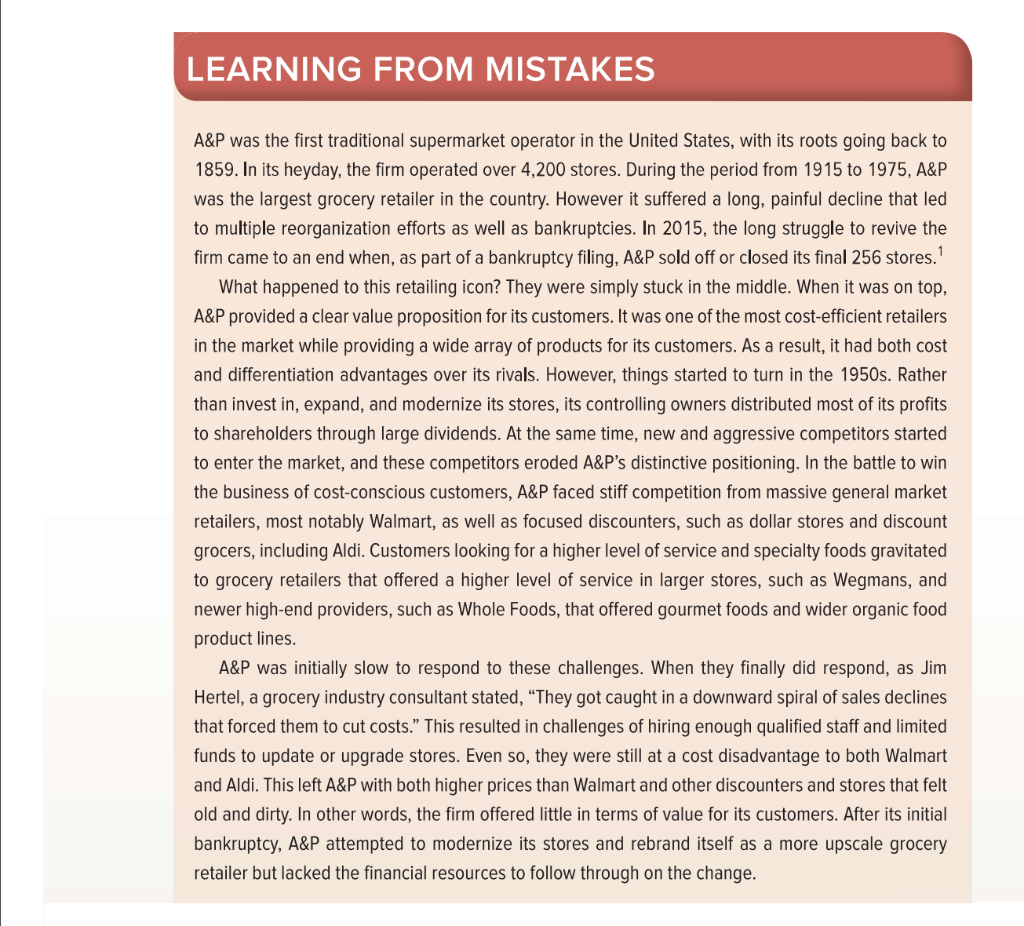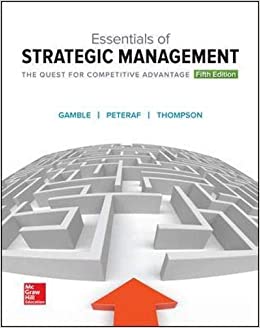Question
1. Explain how A&P was stuck in the middle between two strategies (i.e., between low cost and differentiation strategies)? 2. What decisions did A&P make

1. Explain how A&P was stuck in the middle between two strategies (i.e., between low cost and differentiation strategies)?
2. What decisions did A&P make when it was successful that led to its later failure?
3. We examine five business-level strategies (cost leadership, differentiation, focused cost leadership, focused differentiation, and integrated cost leadership/differentiation). Out of these five business-level strategies, which strategy (or strategies) should A&P have persuaded to respond to the new competitive challenges it faced?
4. What firm do you see today that faces similar challenges? How should this firm respond and act to reinforce its strategic position?
PLEASE ANSWER THE QUESTIONS BELOW. ATTACHED IS THE CASE
THANKS!!
A\&P was the first traditional supermarket operator in the United States, with its roots going back to 1859. In its heyday, the firm operated over 4,200 stores. During the period from 1915 to 1975, A\&P was the largest grocery retailer in the country. However it suffered a long, painful decline that led to multiple reorganization efforts as well as bankruptcies. In 2015 , the long struggle to revive the firm came to an end when, as part of a bankruptcy filing, A\&P sold off or closed its final 256 stores. 1 What happened to this retailing icon? They were simply stuck in the middle. When it was on top, A\&P provided a clear value proposition for its customers. It was one of the most cost-efficient retailers in the market while providing a wide array of products for its customers. As a result, it had both cost and differentiation advantages over its rivals. However, things started to turn in the 1950s. Rather than invest in, expand, and modernize its stores, its controlling owners distributed most of its profits to shareholders through large dividends. At the same time, new and aggressive competitors started to enter the market, and these competitors eroded A\&P's distinctive positioning. In the battle to win the business of cost-conscious customers, A\&P faced stiff competition from massive general market retailers, most notably Walmart, as well as focused discounters, such as dollar stores and discount grocers, including Aldi. Customers looking for a higher level of service and specialty foods gravitated to grocery retailers that offered a higher level of service in larger stores, such as Wegmans, and newer high-end providers, such as Whole Foods, that offered gourmet foods and wider organic food product lines. A\&P was initially slow to respond to these challenges. When they finally did respond, as Jim Hertel, a grocery industry consultant stated, "They got caught in a downward spiral of sales declines that forced them to cut costs." This resulted in challenges of hiring enough qualified staff and limited funds to update or upgrade stores. Even so, they were still at a cost disadvantage to both Walmart and Aldi. This left A\&P with both higher prices than Walmart and other discounters and stores that felt old and dirty. In other words, the firm offered little in terms of value for its customers. After its initial bankruptcy, A\&P attempted to modernize its stores and rebrand itself as a more upscale grocery retailer but lacked the financial resources to follow through on the changeStep by Step Solution
There are 3 Steps involved in it
Step: 1

Get Instant Access to Expert-Tailored Solutions
See step-by-step solutions with expert insights and AI powered tools for academic success
Step: 2

Step: 3

Ace Your Homework with AI
Get the answers you need in no time with our AI-driven, step-by-step assistance
Get Started


